#IRAKERE
Explore tagged Tumblr posts
Text
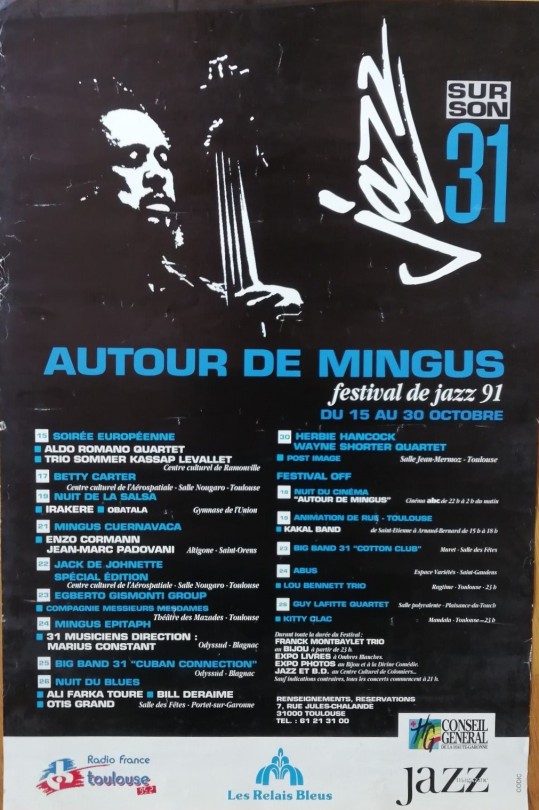
1991 - Jazz sur son 31 - Autour de Mingus - Toulouse (and surrounding towns)
Aldo Romano, Betty Carter, Irakere, Jack DeJohnette Special Edition, Mingus Epitaph, Big Band 31, Herbie Hancock & Wayne Shorter Quartet, Lou Bennett trio, Guy Lafitte Quartet, ...
#jazz#poster flyer#1991#betty carter#irakere#jack dejohnette#herbie hancock#wayne shorter#lou bennett#guy lafitte
12 notes
·
View notes
Text
LÉGENDES DU JAZZ
PAQUITO D’RIVERA, AMBASSADEUR DES MUSIQUES DU MONDE
‘’Music was in my soul and in my heart. I never had the idea to do anything else."
- Paquito D’Rivera
Né le 4 juin 1948 à La Havane, à Cuba, Francisco de Jesús Rivera Figueras était le fils de Francisco ‘’Tito’’ D'Rivera, un saxophoniste classique et chef d’orchestre qui vendait également des instruments de musique. C’est aussi le père de D’Rivera qui lui avait fait connaître les disques de Duke Ellington et de Benny Goodman. Le père de D‘Rivera l’emmenait aussi dans des clubs comme le Tropicana et à des concerts.
Enfant prodige, D’Rivera avait commencé à suivre des cours de théorie et de saxophone avec son père à partir de l’âge de cinq ans. L’année suivante, D’Rivera avait participé à son premier concert et avait interprété une composition écrite par son père. À l’âge de sept ans, D’Rivera était devenu le plus jeune musicien de l’histoire à endosser les célèbres saxophones Selmer. D’Rivera avait seulement dix ans lorsqu’il s’était produit avec le National Theater Orchestra de La Havane en 1958. Formé initialement pour jouer du saxophone soprano, D’Rivera était par la suite tombé en amour avec le saxophone alto et avait appris à jouer de cet instrument en autodidacte avec l’aide d’un manuel.
À l’âge de seulement douze ans en 1960, D’Rivera était entré au Conservatoire de musique de La Havane, où il avait suivi des cours de saxophone, de clarinette et de composition. C’est aussi durant ses études au conservatoire que D’Rivera avait rencontré le pianiste Chucho Valdés pour la première fois. Cinq après son entrée au conservatoire, D’Rivera avait été soliste invité avec le Cuban National Symphony Orchestra dans le cadre d’un concert qui avait été radiodiffusé à travers le pays en 1965. D’Rivera avait continué de jouer avec plusieurs groupes au cours de son adolescence, dont le Cuban Army Band, avant de co-fonder l’Orchestra Cubana de Música Moderna avec Valdés. D’Rivera avait d’ailleurs dirigé l’orchestre pendant deux ans.
DÉBUTS DE CARRIÈRE
En 1973, D’Rivera avait co-fondé avec Valdés le groupe Irakere, qui fusionnait le jazz, le rock, la musique classique et les rythmes afro-cubains. Composé de trois membres de l’Orchestra Cubana de Música Moderna et de trois autres musiciens, le groupe était devenu extrêmement populaire après s’être produit dans le cadre des festivals de jazz de Newport et de Montreux.
En 1979, le groupe avait remporté un prix Grammy dans la catégorie du meilleur enregistrement de jazz latin pour son premier album éponyme. La même année, le groupe s’était produit aux côtés de musiciens de rock et de jazz dans un festival appelé Havana Jam. Les performances du groupe avaient été enregistrées et avaient éventuellement donné lieu à la publication des albums Havana Jam et Havana Jam II (1979), faisant ainsi du groupe le premier ensemble cubain de l’époque post-Catro à signer un contrat avec une compagnie américaine.
De plus en plus insatisfait des contraintes imposées à la pratique de la musique par les autorités cubaines, D’Rivera avait expliqué qu’après avoir fait la rencontre de Che Guevara, son désir de quitter Cuba s’était encore intensifié. Au début de 1980, alors qu’il était en tournée en Espagne, D’Rivera s’était rendu à l’ambassade des États-Unis et avait demandé l’asile politique. D’Rivera avait laissé sa femme et son enfants à Cuba, après leur avoir promis de les faire venir aux États-Unis.
Dès son arrivée aux États-Unis, D’Rivera avait obtenu un grand soutien pour lui et sa famille. Sa mère, Maura, et sa soeur, Rosario, se trouvaient déjà aux États-Unis à l’époque. Elles avaient quitté Cuba en 1968 et étaient devenus citoyennes américains. Sa mère Maura avait travaillé aux États-Unis dans l’industrie de la mode, et sa soeur Rosario était devenue une artiste et femme d’affaires respectée. Après avoir obtenu sa résidence permanente, D’Rivera avait joué avec Dizzy Gillespie, David Amram, Mario Bauza et d’autres musiciens américains bien connus.
D’Rivera s’était particulièrement fait connaître après la publication de ses deux premiers albums, Paquito Blowin' (juin 1981) et Mariel (juillet 1982). Il avait aussi été en vedette dans le Time Magazine et dans des émissions de télévision comme CBS Sunday Morning.
Avec Gillespie, D’Rivera avait participé à la fondation du United Nations Orchestra en 1988, un groupe de fusion de quinze musiciens qui faisait la synthèse entre le jazz et la musique latine. La même année, D’Rivera avait joué comme soliste avec le National Symphony Orchestra et le Brooklyn Philarmonic Orchestra.
En 1991, toujours comme membre du big band de Gillespie, D’Rivera avait participé aux côtés de James Moody, Slide Hampton, Airto Moreira, Flora Purim, Arturo Sandoval et Steve Turre à l’enregistrement de l’album Live at the Royal Festival Hall.
En plus de ses collaborations avec l’orchestre de Gillespie, D’Rivera s’était produit avec de nombreux autres groupes, dont Triangulo, qui jouait du calypso et de la salsa, et le Caribbean Jazz Project. D’Rivera avait également formé deux groupes qui combinaient sa passion pour le jazz et la musique classique, le Paquito D'Rivera Big Band et un groupe de musique de chambre appelé le Paquito D'Rivera Quintet. D’Rivera avait aussi commencé à composer pour d’autres groupes, dont le Gerald Danovich Saxophone Quartet de Montréal (qui a enregistré sa célèbre ‘’New York Suite’’), le Caracas Clarinet Quartet, le Cuarteto Latinoamericano, le Quinteto D’Elas et le Aspen Wind Quintet.
ÉVOLUTION RÉCENTE
D'Rivera avait continué d’enregistrer et de se produire en concert durant les années 1990 et 2000. En 1999, D'Rivera s’était produit à la Maison-Blanche et au Kennedy comme artiste invité dans le cadre du concert Americanos. En 2000, D’Rivera avait publié les albums Music From Two Worlds et Habanera. Brazilian Dreams avait suivi en 2002. En 2001, D’Rivera avait aussi été un des principaux solistes du film Calle 54 du réalisateur Fernando Trueba.
En 2003, D'Rivera avait remporté ses cinquième et sixième prix Grammy, respectivement pour les albums Brazilian Dreams et Historia del Soldado. En 2017, D'Rivera avait publié l’album Paquito D’Rivera presents the Vitral String Quartet. L’album comprenait trois compositions de D’Rivera intitulées ‘’Afro’’, ‘’Wapango’’ et ‘’Kites Over Havana.’’ Dans son compte rendu de l’album, le New York City Jazz Record écrivait:
“In the realm of chamber music, string and brass quartets are a well-established tradition, which allow the melodic colors of their instrumentation to weave a deeply satisfying harmonic tapestry…The Vitral Saxophone Quartet (Oscar Gongora: soprano; Roman Filiu: alto; Alejandro Rios: alto and tenor; Raul Cordies: baritone) is a prime example of the beauty that four saxophones can produce. Kites Over Havana is a gorgeous entry into the canon.”
Reconnu pour son travail de musicien et de compositeur tant dans les domaines du jazz que de la musique classique, D'Rivera avait également décroché plusieurs commandes, notamment pour sa composition "Gran Danzon (The Bel Air Concerto)’’, un concerto pour flûte qui lui avait été commandé par le Rotterdam Philharmonic et le National Symphony Orchestra, et qui avait été présenté en grande première au Kennedy Center for the Performing Arts de Washington, D.C., en 2002. Le critique Joe Banno avait écrit au sujet de l’oeuvre dans le Washington Post en février 2002: ‘’... Best that night was Paquito D’Rivera’s Grand Danzon (The Bel Air Concerto) in its world premiere. A spiky and imaginatively colored piece of Latin American orchestral writing.’’ L’oeuvre avait de nouveau été présentée par le Baltimore Symphony Orchestra au Lincoln Center en avril 2006. En 2000, le Jazz at Lincoln Center avait également commandé à D’Rivera une "Pan American Suite" dans le cadre de la série As of Now. L’oeuvre avait éventuellement été diffusée sur le réseau NPR.
D’Rivera est également l’auteur d’une sonate pour clarinette intitulée ‘’The Cape Cod Files’’. L’oeuvre, qui avait été commandée à D’Rivera par le Cape Cod Chamber Music Festival en 2009, a été présentée en grande première par la Silicon Valley Symphony��en mai 2011. D’Rivera avait également composé pour le Turtle Island String Quartet, le Ying Quartet et l’International Double Reed Society. En 2002, la Bibliothèque nationale du Congrès avait commandé à D’Rivera ‘’Fiddle Dreams’’, une fantaisie pour violon et piano qui avait été écrite en hommage à la violoniste Regina Carter.
La composition de D'Rivera, ‘’Lady in White’’ a été présentée sous forme de ballet par la José Limón Dance Company en 2012. En 2019, le concerto pour trompette de D’Rivera ‘’Concerto Venezolano’’ a été présenté en première à Mexico City par l’Orquesta de Mineria dirigée par Miguel Prieto. Le soliste était Pacho Flores, pour qui l’oeuvre avait été composée. En juin 2022, le New Jersey Symphony Orchestra avait également présenté un Concerto pour cor français qui comprenait des mouvements écrits par quatre compositeurs, dont D’Rivera. L’orchestre était dirigé par Xian Zhang. Le soliste était Chris Komer. Parmi les autres concertos de D’Rivera, on remarquait ‘’Conversations with Cachao’’. Concerto pour contrebasse et saxophone, l’oeuvre qui rendait hommage au légendaire contrebassiste cubain Israël ‘’Cachao’’ Lopez, avait été présentée en grande première à Caramoor en juin 2007. Une autre composition récente de D’Rivera était intitulée "Three Poems from the New World", et s’inspirait des oeuvres de Fortunato Villarrondo, José Martí et Dana Gioia. Les trois poèmes qui exploraient les thèmes de l’intolérance raciale, de la haine et de l’injustice, tentaient de leur substituer des valeurs comme l’amitié, l’amour et le respect de la vie.
D'Rivera avait aussi été artiste en résidence au New Jersey Performing Arts Center, et directeur artistique de la New Jersey Chamber Music Society. Il a également été compositeur en résidence au Caramoor Center for Music and the Arts en 2007. Depuis 1995, D'Rivera est aussi directeur artistique du Festival International de Jazz en el Tambo en Uruguay. Il est aussi directeur artistique du Duke Ellington Festival de Washington, D.C.
Parallèlement à ses autres activités, D'Rivera continue régulièrement de se produire en tournée avec différents groupes à travers le monde, dont le Paquito D'Rivera Big Band, the Paquito D'Rivera Quintet et le Chamber Jazz Ensemble. Le groupe régulier de D'Rivera, le Paquito D'Rivera Quintet, est formé du trompettiste argentin Diego Urcola, du pianiste Alex Brown, du contrebassiste péruvien Oscar Stagnaro et du batteur Mark Walker. Le groupe s’est mérité un prix Grammy pour le meilleur album de jazz latin en 2001.
D'Rivera a aussi fait de fréquentes apparitions comme soliste invité avec des orchestres comme le London Philharmonic et la Costa Rican National Symphony. Parmi les autres orchestres avec lesquels D'Rivera avait collaboré, on remarquait le National Symphony Orchestra, le Warsaw Philharmonic Orchestra, le Florida Philharmonic Orchestra, le Baltimore Symphony, le Bronx Arts Ensemble, le Puerto Rico Symphony Orchestra, le YOA Orchestra of the Americas, l’American Youth Philharmonic et le Simón Bolívar Symphony Orchestra.
D'Rivera a publié une autobiographie intitulée Mi Vida Saxual (My Sax Life) en 2005. Le prologue de l’ouvrage avait été écrit par l’écrivain cubain Guillermo Cabrera Infante. Également auteur, D’Rivera a publié une nouvelle intitulée ‘’En tus brazos morenos.’’
D'Rivera vit actuellement à North Bergen, New Jersey, avec son épouse, la chanteuse Brenda Feliciano. Le fils de D'Rivera, Franco, est également compositeur et a collaboré avec son père dans le cadre de compositions pour l’American Saxophone Quartet de New York.
D'Rivera avait toujours rêvé de réaliser une sorte de symbiose entre ses deux passions: le jazz et la musique classique. Les prix qu’il avait remportés et le respect dont il avait bénéficié tant dans le domaine du jazz que de la musique classique semblent démontrer qu’il avait parfaitement atteint cet objectif. En fait, D’Rivera était devenu si renommé comme compositeur classique que le Kammer Orchester Schloss Werneck avait développé en 1999 une série intitulée ‘’Paquito & Mozart’’ dans laquelle ses compositions de musique de chambre avaient été présentées aux côtés de celles de Wolfgang Amadeus Mozart ! Le point culminant du concert était un Adagio composé par D’Rivera qui comportait des éléments du concerto pour clarinette en A Majeur de Mozart. Peter Linhart écrivait dans le Main Echo Aschaffenburg de Montag en juin 1999: ‘’The orchestra as well as the soloist executed the work with perfect intonation and precise interpretation. At no time came the impression that two different musical worlds were colliding. The concert was an offering of excellence by virtue of the soloist and the orchestra, led by Ulf Klautsenitzer. With a focused tone and intonation, he effortlessly graced through the various registers unwavering...’’ En 2000, D’Rivera avait également obtenu une nomination aux prix Grammy pour son album Music of Two Worlds, qui comprenait ses propres compositions aux côtés de celles de Schubert, Brahms, Guastavino et Villa Lobos.
Excellant également dans le domaine bebop, D'Rivera est le seul artiste à avoir remporté des prix Grammy dans les catégories de jazz latin et classique en 2003. D'Rivera a également été juge lors du 5e et du 8e gala des Independent Music Awards destinés à récompenser le travail des artistes indépendants.
Paquito D'Rivera a remporté de nombreux honneurs au cours de sa carrière. En 1991, dans le cadre d’une performance à Carnegie Hall, la National Hispanic Academy of Media Arts and Sciences avait décerné à D'Rivera un Lifetime Achievement Award pour sa contribution à la musique latine. En 1999, à l’occasion de son 500e anniversaire, la Universidad de Alcala de Henares avait accordé à D’Rivera un prix spécial afin de souligner sa contribution aux arts, son humanisme et sa défense des droits et des libertés des artistes à travers le monde.
D’Rivera a été élu ‘’Jazz Master’’ par la National Endowment for the Arts en 2005. D’Rivera avait accepté son prix en lisant la déclaration suivante:
"Since I was a kid, my father, a classical tenor who loved jazz, introduced me to the music of Lionel Hampton, Count Basie, Benny Carter and Teddy Wilson. Later on I grew up listening to the likes of Dizzy Gillespie, Benny Golson, Max Roach, Ella, Sarah {Vaughan}, Carmen {McRae}, Dave Brubeck, The Heath Brothers, Gil Evans, Clark Terry and Jackie McLean. Now, 50 years after my first public performance, it feels like an incredible dream, to share the NEA Jazz Masters distinction with these giants that gave my life meaning."
Toujours en 2005, le gouvernement américain avait décerné à D’Rivera la National Medal of Arts. Nommé clarinettiste de l’année par la Jazz Journalists Association en 2004 et 2006, D'Rivera a également été nommé Living Jazz Legend Award par le Kennedy Center de Washington, D.C., en 2007. D’Rivera est aussi récipiendaire d’un President's Award de l’International Association for Jazz Educators en 2008. En 2009, D’Rivera avait également été décoré de la médaille d’honneur du National Arts Club. L’année suivante, le Spelman College avait décerné à D’Rivera un African-American Classical Music Award.
En 2017, D’Rivera a aussi remporté un Bogomolny National Service Award de la Chamber Music America en reconnaissance de ses efforts pour inspirer les nouvelles générations de musiciens. La National Hispanic Academy of Media Arts and Sciences a également rendu hommage à D'Rivera en lui décernant un Achievement in Music Award. D’Rivera a remporté huit prix Grammy au cours de sa carrière.
Lauréat d’une bourse de composition de la Fondation Guggenheim en 2007, D'Rivera s’est aussi mérité plusieurs doctorats honorifiques, provenant d’institutions aussi prestigieuses que le Berklee College of Music (2003), la State University of New York à Old Westbury (2012), la Manhattan School of Music, l’Université de Pennsylvanie, la City University of New York (CUNY) et l’Universidad de Alcalá de Henares, en Espagne.
Toujours très attaché à son pays d’origine, D'Rivera avait sévèrement critiqué le guitariste Carlos Santana pour avoir porté un T-shirt à l’effigie de Che Guevara lors du gala des Academy Awards en 2005. Dans sa lettre, D'Rivera avait rappelé le rôle joué par Guevara dans l’éxécution de contre-révolutionnaires cubains, dont celle d’un de ses cousins.
D’Rivera avait toujours rêvé de devenir musicien et n’avait jamais songé à faire autre chose. Comme il l’avait déclaré en entrevue, ‘’Music was in my soul and in my heart. I never had the idea to do anything else." D’Rivera a enregistré plus de trente albums sous son nom au cours de sa carrière. Sur son site internet, la National Endowment of the Arts avait écrit au sujet de D’Rivera: ‘’He has become the consummate multinational ambassador, creating and promoting a cross-culture of music that moves effortlessly among jazz, Latin and Mozart.’’
©-2024, tous droits réservés, Les Productions de l’Imaginaire historique
SOURCES:
‘’Paquito D’Rivera.’’ Wikipedia, 2023.
‘’Paquito D’Rivera.’’ All About Jazz, 2023.
‘’Paquito D’Rivera.’’ National Endfowment for the Arts, 2023.
‘’Paquito D’Rivera Biography.’’ Net Industries, 2023.
2 notes
·
View notes
Text

Jesús Valdés Rodríguez, known as Chucho Valdés (October 9, 1941) is a Cuban pianist, bandleader, composer, and arranger whose career spans over 50 years. An original member of the Orquesta Cubana de Música Moderna, in 1973 he founded the group Irakere, one of Cuba’s best-known Latin jazz bands. Both his father, Bebo Valdés, and his son, Chuchito, are pianists as well. As a solo artist, he has won four Grammy Awards and three Latin Grammy Awards.
In 1967, he and his bandmates became founding members of Orquesta Cubana de Música Moderna, together with many other well-known Cuban musicians. This all-star big band would back singers such as Elena Burke and Omara Portuondo. In 1973, he along with other members of the Orquesta Cubana de Música Moderna founded Irakere, an ensemble that bridged Songo and Afro-Cuban jazz. He would continue his solo career, signing with Blue Note Records, which allowed him to get international exposure. #africanhistory365 #africanexcellence
1 note
·
View note
Text
5/30 おはようございます。 Banda Black Rio / Gafieira Universal 1030268 等更新しました。
Della Reese / The Story Of The Blues SAH-J6021 Denise Darcel / Banned In Boston LP1002 Curtis Counce / You Get More Bounce With Curtis Counce Vol2 C3539 Norman Panama Melvin Frank Michael Kidd / Li'l Abner Ol5150 Miles Davis / Miles Ahead 682013tl Ron Geesin / Right Through RON323 Sly & the Family Stone / Back on the Right Track bsk3303 Sly & the Family Stone / Small Talk bl32930 Chakachas / Jungle Fever PD5504 Johnny Bristol / Bristol's Creme SD18197 Tania Maria / Made in New York st53000 Joao Bosco / Joao Bosco 74321230121 Banda Black Rio / Gafieira Universal 1030268 Joyce / Feminina 422862 Emilio Santiago / Emilio Santiago lpcid8028 Irakere / Irakere LD-3726 Jorge Ben / Energia 445004 Antonio Carlos Jobim / O Prestigio De Antonio Carlos Jobim 81115912

~bamboo music~
530-0028 大阪市北区万歳町3-41 シロノビル104号
06-6363-2700
2 notes
·
View notes
Text
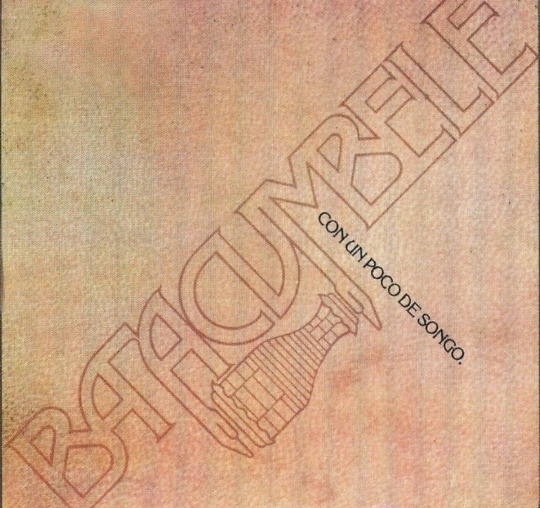
Batacumbele [meaning "to kneel before the drum" in Yoruba] was founded in 1980 in San Juan, Puerto Rico by master percussionist Angel "Cachete' Maldonado and is one of the leading Afro-Caribbean ensembles in the world. It is to contemporary Puerto Rican music what Irakere is to Cuba.
When Angel wanted to become more serious about native Puerto Rican drumming, he sought out Julio 'Caesar' Maco Rivera. There were the traditional congas, bongos, timbales, and other hand drums, but he was also introduced to the bata drums and their Yoruban sacred ceremonial rituals of Orisha. At the time the bata drum was rarely played in Puerto Rico, this being a strong Cuban influence that would permeate later thanks to Angel's introduction of these drums to a greater audience.
Angel was soon good enough to join up with Johnny El Bravo, who fronted one of the most popular dance groups on the island. By 1970, salsa was very popular. This introduced Angel to other musicians, such as Julito Collazo and Carlos 'Patato' Valdes, the Cuban drum masters who brought awareness of the bata drums to New York, where Angel relocated in the early 70s to join the salsa explosion there.
Angel also played for salsa bands La Conspiracion, Conjunto Libre, and Tipica 73, and for salsa pianist Larry Harlow. He played with Gato Barbieri for four years after being asked to join his band. He even did some gigs with Dizzy Gillespie.
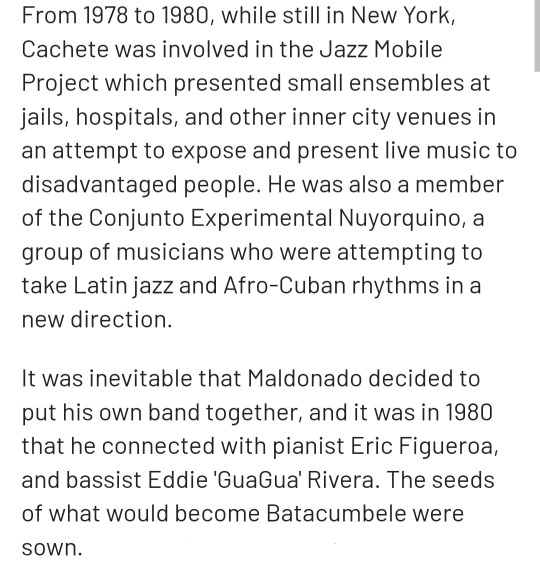



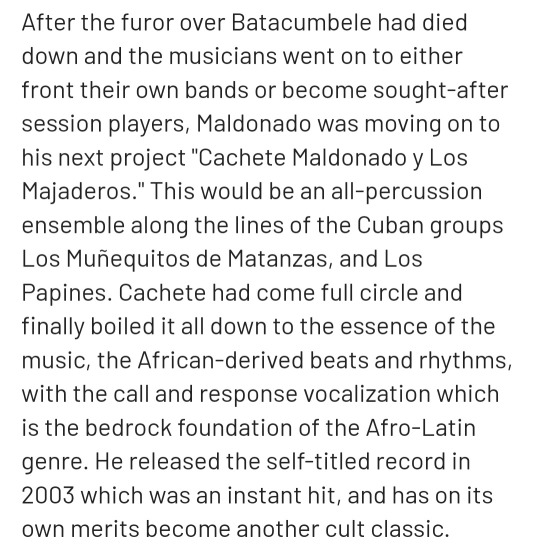
7 notes
·
View notes
Text
I have a few recs for jazz newcomers that might be less obvious, but I think could appeal to those coming with outside tastes
youtube
Roy Hargrove - earfood [2008]
A modern classic by former new guard of the straight ahead revival in the 80s/ 90s (contemporaries include Christian McBride, Joshua Redman, et al) turned gone-too-soon legend Roy Hargrove. Strasbourg St. Denis at this point has entered the canon of Jazz standards. There's not as much swing on this record as there are other grooves that a modern audience might be more accustomed too, but every one of the musicians on here are deeply embedded in the history of the music. Also, did you know he was on D'Angelo's acclaimed 2nd Album Voodoo?
youtube
Count Basie - Atomic Basie [1958;reissue 1994]
Basie sits on the Mt. Rushmore of bandleaders. Over decades his Orchestra has embodied the essence and red-hot excitement of big band Swing music. The Atomic Basie record is a lot of people's favorite from the catalogue for a reason. The band, with Neal Hefti's charts, bring some FIRE, and even when the tempo is brought down the rhythm feels too damn good. Essential listening.
youtube
Irakere [Live 1979]
Founded and led by Pianist Chucho Valdez, Irakere represented a long-absent cultural bridge between Cuba and the U.S. Their fusion of Afro-Cuban rhythms, bebop vocabulary, jazz fusion/funk, and more was State-mandated, innovative, and captivating (also they play their absolute asses off). They represent an important, albeit less known these days, piece in the history of Afro-Cuban jazz. Many of it's core/founding members have become legends of mainstream jazz (Chucho, Paquito D'Rivera, Arturo Sandoval).
I'm all for people who wanna jump in with Kind of Blue or A Love Supreme, and there are lots of people who aren't necessarily jazz heads who love those albums, but if you find that often recommended classics are not clicking, there is definitely something out there that will.
it was international jazz day and all you guys listened to was a single album??
21K notes
·
View notes
Text
tried out the double live irakere cd i got and wow.... that shit goes hard..... i was kinda moping around all day but that snapped me out of it real fast they're just so good !
1 note
·
View note
Text
Chucho Valdés Trio Live in NYC (Full Concert) | Jazz Icons at Trinity Church, Wall Street

Chucho Valdés Trio Live in NYC (Full Concert) | Jazz Icons at Trinity Church, Wall Street.
https://www.youtube.com/watch?v=Zqfmo0ZlyCw Chucho Valdés Trio. Cuban pianist, composer, and arranger Cuban pianist, composer, and arranger Chucho Valdés is the most influential figure in modern Afro-Cuban jazz. He is perhaps best known for helming the iconic Cuban ensemble Irakere (1973–2005). In a career spanning more than 60 years, Valdés has distilled elements of the Afro-Cuban music tradition, jazz, classical music, rock, and more into a deeply personal style. He is joined by bassist Jose Armando Gola and percussionist Roberto Vizcaíno Jr. for what is sure to be a transcendent performance. The concert is presented in collaboration with JAZZ HOUSE KiDS.

Winner of seven GRAMMY® and five Latin GRAMMY® Awards, Mr. Valdés, received a Lifetime Achievement Award from the Latin Academy of Recording Arts & Science last year and was also inducted into the Latin Songwriters Hall of Fame. Mr. Valdés celebrated his 80th birthday on October 9, 2021, completing La Creación (The Creation), a three-movement suite for a small ensemble, voices, and a big band. The piece, the most ambitious work of his career, tells the history of Creation according to the Regla de Ocha, the Afro-Cuban religion known as Santería.

The Creation was a commission of the Adrianne Arsht Center for the Performing Arts of Miami-Dade County, the John F. Kennedy Center for the Performing Arts in Washington, DC, the Chicago Symphony Center, and the Los Angeles Philharmonic Association. It had its world premiere on November 5, 2021, at the Adrienne Arsht Center.

Performances followed in several U.S. cities, including Jazz at Lincoln Center in New York City, the Detroit Jazz Festival in Detroit, MI, and the Monterey Jazz Festival, in Monterey, CA. In Europe, the tour began at the Philharmonie in Paris and included performances in Berlin, London, Hamburg, Lyon, and Barcelona (Mr. Valdés is the godfather of the International Jazz Festival). Another significant recent development was the long-awaited reunion with his old friend and co-conspirator in many musical adventures, the extraordinary clarinetist, saxophonist, and composer Paquito D’Rivera. They have rarely played together for the past 40 years, and since their reunion, they have wasted no time. In January 2022, they recorded an album entitled I Missed You Too, and embarked on a tour with their Reunion Sextet that took them to Europe and the United States. Born in a family of musicians in Quivicán, Havana province, Cuba, on October 9, 1941, Dionisio Jesús “Chucho” Valdés Rodríguez, has distilled elements of the Afro-Cuban music tradition, jazz, classical music, and rock into an organic, deeply personal style. His first teacher was his father, the pianist, composer, and bandleader Ramón “Bebo” Valdés. By the age of three, Mr. Valdés was already playing on the piano melodies he heard on the radio — using both hands and on any key. He began taking lessons on piano, theory, and solfege at the age of five. He continued his formal musical education at the Conservatorio Municipal de Música de la Habana, from which he graduated at 14. A year later, Mr. Valdés formed his first jazz trio. In 1959, he debuted professionally with the band Sabor de Cuba. The ensemble, directed by his father, is widely considered one of the great orchestras in modern Cuban music. Fittingly, Mr. Valdés made his early mark as the founder, pianist, and leading composer and arranger of another landmark ensemble: the small big band Irakere (1973-2005). With its audacious mix of Afro-Cuban ritual music, Cuban dance music, jazz, classical music, and rock, Irakere marked a before and after in Latin jazz. Irakere’s self-titled debut recording in the United States won a Grammy as Best Latin Recording in 1979. While he remained with Irakere until 2005, Mr. Valdés launched a parallel career in 1998 both as a solo performer and a small-group leader. It marked the beginning of an enormously fruitful period highlighted by albums such as Solo Piano (Blue Note, 1991), Solo: Live in New York (Blue Note, 2001), as well as quartet recordings such as Bele Bele en La Habana (Blue Note, 1998), Briyumba Palo Congo (Blue Note, 1999), New Conceptions (Blue Note, 2003), and Live at the Village Vanguard (Blue Note, 2000), which won a Grammy for Best Latin Jazz Album. After leaving Irakere, Mr. Valdés also won Grammys for Juntos Para Siempre (Calle 54, 2007), the duet recording with his father, Bebo; and, Chucho’s Steps (Comanche, 2010), which introduced his new group, the Afro-Cuban Messengers. But such success didn’t mean forgetting past achievements. In 2015, Mr. Valdés celebrated the 40th anniversary of the birth of Irakere, his iconic band, with a world tour. Tribute to Irakere: Live at Marciac (Jazz Village / Comanche Music), which captured a performance on that tour, won a Grammy for the Best Latin Jazz Album in 2016. He also won a Latin Grammy as Best Latin Jazz album for Jazz Batá 2, in which he revisited a revolutionary idea Mr. Valdés first recorded in 1972: a piano jazz trio featuring batá drums. In 2022, Chucho Valdés won a Grammy and a Latin Grammy for Mirror Mirror, an album of duets by pianist and singer Eliane Elias with Mr. Valdés and the great late pianist Chick Corea. Read the full article
#SMLPDF#noten#partitura#sheetmusicdownload#sheetmusicscoredownloadpartiturapartitionspartitinoten楽譜망할음악ноты#spartiti
0 notes
Text
Irakere - Misa Negra (Album)
Rare Latin Jazz record with deep afro-cuban mysticism
0 notes
Text
🙏🏿🕊@amp_fiddler 🕊🙏🏿
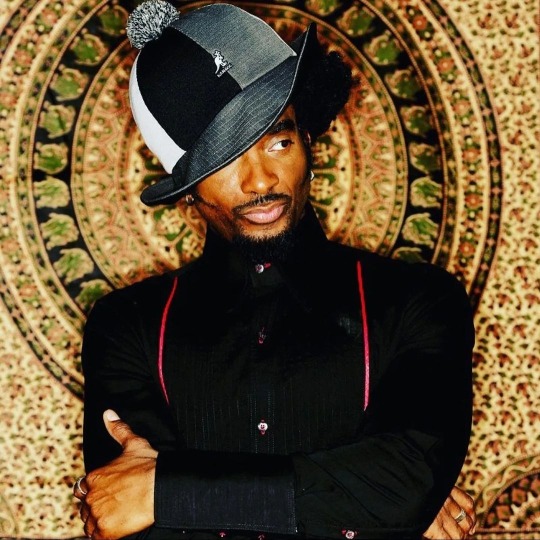
(#AfroStrut 📸John Roe)
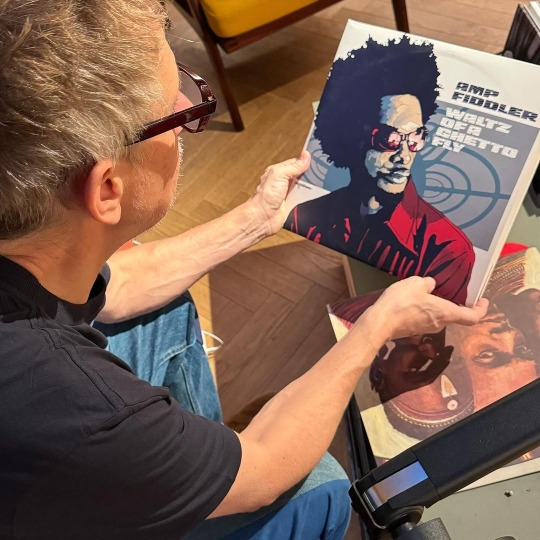
Reposted from @gillespeterson 🎧A tribute to #AmpFiddler today on @worldwide.fm …. And a beautiful session + interview from @bel.cobain in the Mezz…
https://worldwidefm.net/collection/gilles-peterson
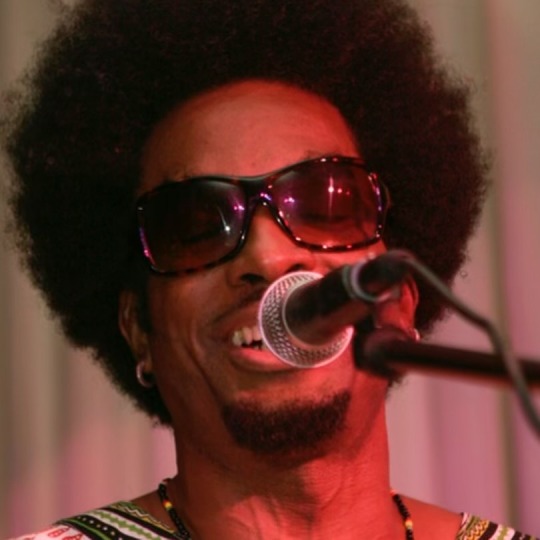
tracks played:
The Detroit Experiment - Space Odyssey
Tribe - Vibes From the Tribe
——————————
@amp_fiddler - Words & Music (2003]
Amp Fiddler - Love & War [live in session]
Amp Fiddler - Eye to Eye [live in session]
Amp Fiddler - I Believe In You [live in session]
——————————
Sundown - Spaced Outta Place Pt. 1
Sundown - Spaced Outta Place Pt. 2
L.J. Reynolds - Key To The World
Trus’me - Can We Pretend
Visioneers - Runnin’ ) @oreh4 @marc4hero
@therealdavinamusic - I Can’t Help It
@thebrandnewheavies - Dream On Dreamer
@altonmiller and @amp_fiddler - When the Morning Comes (Phil Asher’s Restless Soul Mix)
Innerzone Orchestra - People Make The World Go Round (Kenny Dixon Jnr remix) @moodymann313
@recloose - Ain’t Changin’ ( @carlcraignet Dark Soul Mix)
@officialmeshell - Friends
@moodymann313 - Sloppy Cosmic [@werpfunk - Cosmic Slop (Moodymann Mix)]
@prince & @yolikegeorge - We Can Funk
@ladysmithblackmambazo60 - Scatter The Fire
@slyandrobbie & Amp Fiddler - I Believe In You
Amp Fiddler feat. @reddsnappa48, @dezandresmahogani & Bubz Fiddler - No Politics
@maxwell - Ascension (Don’t Ever Wonder)
Theo Parrish feat. Amp Fiddler - Usually Suspected / The Quest
Bel Cobain - Unlikely
—————
BEL COBAIN IN SESSION
Bel Cobain - Pressure To Exist [live]
Bel Cobain - Came Over Me [live]
Bel Cobain - Leader [live]
—————
@officialaugustuspablo - East of The River Nile
@ninasimone - Vous Etes Seuls, Mais Je Désire Etre Avec Vous
@outkast with @ceelogreen - Liberation
Bel Cobain - Unsafe House
Bel Cobain - Awakening
@olivernight feat. @suziwong23 - The Light
Irakere - Chekeré Son
@miguelatwoodferguson & Suite For Ma Dukes Orchestra feat. @therealdwele - Angel (live)
Rima feat. @georglevinmusic - Subdued (Amp Fiddler Future Remix)
@scubaofficial feat. Amp Fiddler - If I Dub
#ArtIsAWeapon #MusicIsLife #DetroitLegend
0 notes
Text
What Kind of Music Do People Listen to in Cuba?
When it comes to the rich and diverse music scene of Cuba, one cannot overlook the significant contributions of its famous Cuban singers. These talented artists have not only shaped the auditory landscape of the country, but they have also left an indelible mark on the global music industry. From the soulful melodies of bolero to the infectious rhythms of salsa and the revolutionary sounds of nueva trova, Cuban singers have captured the hearts of audiences worldwide with their unique voices and captivating performances.
Exploring the Vibrant Music Scene of Cuba
Cuban singers, with their unique styles and powerful vocals, have played a pivotal role in shaping the diverse musical landscape of Cuba. In this article, we will explore the captivating world of Cuban music and delve into the genres that have been made famous by remarkable Cuban singers.
1. Son - The Root of Cuban Music
Son is a genre that emerged in the early 20th century and continues to captivate audiences with its infectious rhythms and heartfelt lyrics. Blending Spanish guitar with Afro-Cuban percussion, Son represents the soul of Cuban music. Its syncopated beats and lively dance moves create an irresistible energy that permeates the air. Son tells stories of love, joy, and the struggles of everyday life, offering a glimpse into the heart and soul of the Cuban people. With its timeless melodies and enduring popularity, Son has become a cherished cultural treasure, embodying the rich musical heritage of Cuba and serving as a foundation for the diverse genres that have emerged from the island.
2. Salsa - The Global Phenomenon
Salsa, which is born in Cuba, has transcended borders and captivated audiences worldwide. This vibrant genre, influenced by Cuban son and other Afro-Cuban rhythms, has been propelled to new heights by some of the most famous Cuban musicians. Celia Cruz, the beloved Queen of Salsa, with her electrifying voice and charismatic stage presence, became an icon of the genre and popularized salsa internationally. Another legendary figure is Issac Delgado, known for his soulful interpretations and innovative approach to salsa. These influential musicians, along with many others, have brought the infectious rhythms and passionate spirit of Cuban salsa to the forefront of the global music scene, making it a cherished genre enjoyed by millions worldwide.
3. Afro-Cuban Jazz - A Melting Pot of Styles
Afro-Cuban jazz is a captivating genre that melds the improvisational nature of jazz with the vibrant rhythms and melodies of Afro-Cuban music. This fusion creates a unique and electrifying sound that mesmerizes listeners. With its pulsating percussion, complex harmonies, and soulful melodies, Afro-Cuban jazz takes audiences on a captivating musical journey filled with passion and energy. Pioneers like Chucho Valdés and Irakere have pushed the boundaries of the genre, infusing it with elements of funk and rock to create a dynamic and innovative musical experience. Afro-Cuban jazz not only showcases the immense talent of its musicians but also represents the cultural richness and diversity of Cuba.
4. Timba - A Modern Cuban Sound
Timba is a dynamic and modern genre of music that emerged in Cuba during the 1990s. It is a fusion of various musical styles, including salsa, jazz, funk, and hip-hop, resulting in a high-energy and infectious sound. Timba is characterized by its complex arrangements, syncopated rhythms, and vibrant performances. It has gained immense popularity among younger generations in Cuba and beyond, with artists like Los Van Van and NG La Banda leading the way. Timba represents a new wave of Cuban music that pushes the boundaries and appeals to contemporary tastes, infusing traditional elements with modern influences. Its irresistible beats and catchy melodies make it impossible to resist moving to the rhythm and experiencing the sheer joy of this captivating genre.
5. Bolero - The Soulful Serenade
Bolero, a genre of traditional Cuban music, holds a cherished place in the hearts of Cubans and music lovers worldwide. With its soulful melodies, heartfelt lyrics, and captivating rhythms, bolero evokes a sense of nostalgia and romance. Originating in the late 19th century, this genre has stood the test of time, becoming a timeless expression of love and longing. Bolero showcases the rich cultural heritage of Cuba, embodying the essence of traditional Cuban music. Artists like Benny Moré and Ibrahim Ferrer have left an indelible mark on the genre, enchanting listeners with their passionate interpretations. Whether performed in an intimate setting or enjoyed through recordings, bolero continues to captivate audiences, transcending borders and generations.
The music of Cuba is a captivating tapestry of genres that reflects the nation's vibrant cultural heritage and diverse influences. From the rhythmic beats of son and salsa to the soulful melodies of bolero and the socially conscious lyrics of nueva trova, Cuban music offers a rich and dynamic auditory experience. Whether it's the infectious energy of timba or the nostalgic serenades of bolero, the music of Cuba holds a special place in the hearts of its people. It is a powerful form of expression that unites communities, preserves traditions, and celebrates the indomitable spirit of the Cuban people.
1 note
·
View note
Text
youtube
Chucho Valdés Irakere 50 "Estela Va a Estallar" | Jazz in Marciac 2024
Osvaldo Fleites (tp), Eddy De Armas Jr. (tp), Carlos Averhoff Jr. (ts), Luis Beltran (as), Chucho Valdés (p), José A. Gola (b), Horacio Hernandez (dr), Roberto Jr. Vizcaino Torre (perc)
10 notes
·
View notes
Text
irakere - ya ve! 3/24/2013, 5:38:56 PM
0 notes
Video
youtube
Pare Cochero - Chucho Valdés; Irakere MAS MUSICA
0 notes
Text
11/29 おはようございます。Horace Andy / Skylarking SADLP1 など更新しました。
Lorez Alexandria / More of the Great As76 Anita O'day / Anita Sings The Most Mgv8259 Tony Scott Jimmy Knepper / Free Blown Jazz Lp12/113 Barry Harris / Magnificent Prst7733 Wynton Kelly Wes Montgomery / Smokin' At The Half Note v6-8633 Benny Goodman / Vintage Goodman cl821 Gildo Mahones / I'm Shooting High Pr16004 Elvin Jones / Puttin' It Together Bst84282 Michael Mantler Carla Bley / 13&3/4 watt/3 向井滋春 Astrud Gilberto / So & So Yf7065bd Judy Roberts / the Other World ic1088 Edwin Birdsong / Phiss-Phizz - Goldmine 2Z83671 Horace Andy / Skylarking SADLP1 Irakere / 2 JC36107 Josyara / Mansa Furia TS-009
~bamboo music~
530-0028 大阪市北区万歳町3-41 シロノ��ル104号
06-6363-2700


0 notes